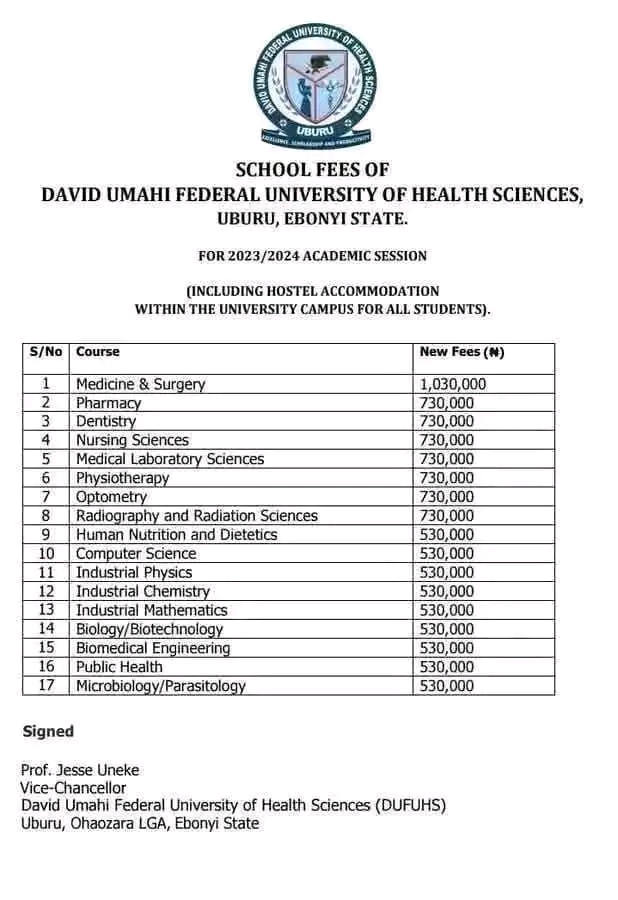(DDM) – The recently released school fees schedule for the 2023/2024 academic session at the David Umahi Federal University of Health Sciences (DUFUHS), Uburu, Ebonyi State, has sparked outrage and concern among Nigerians who say the fees are unaffordable, especially in a country where the national minimum wage remains ₦70,000.
Diaspora Digital Media (DDM) gathered that the university, which was established in 2021 to provide high-quality medical education and reduce Nigeria’s dependence on foreign-trained health professionals, has published its tuition structure for all departments, including hostel accommodation.
According to the list, students studying Medicine and Surgery are expected to pay ₦1,030,000, while those in Pharmacy, Nursing, Dentistry, Physiotherapy, Optometry, and Radiography will pay ₦730,000 each. Meanwhile, courses such as Biomedical Engineering, Biology, Computer Science, and Public Health are pegged at ₦530,000.
The revelation has led to a flood of criticism from citizens, who describe the fees as unrealistic and discriminatory against economically disadvantaged families.
Many argue that even with the inclusion of hostel accommodation, the cost of over one million naira for a federal university is deeply alarming.
Nigeria’s minimum wage is ₦70,000 monthly, totaling ₦840,000 per annum for civil servants fortunate enough to be paid consistently.
Yet, even this amount is not enough to cover tuition fees in DUFUHS for many of the offered courses. For families earning below or around this income threshold, sending a child to the university has become a luxury they cannot afford.
Observers point out the contradiction between government policies that promise inclusive education and real, world financial barriers that keep poor Nigerians out of critical fields like medicine, nursing, and engineering.
This trend further fuels the argument that public universities in Nigeria are gradually becoming elitist spaces, accessible mainly to the wealthy or politically connected.
What adds to the frustration is the state of the Nigerian job market, where thousands of graduates, including those from medical and science-related disciplines, are unable to find work in their fields.
Instead, many are forced to pivot into unrelated sectors such as fashion, tech, ride-hailing, or small-scale trading to survive.
In some cases, students resort to acquiring alternative vocational skills during or after graduation to cushion the unpredictability of the labor market.
An anonymous parent, who spoke with Diaspora Digital Media (DDM), described the fee structure as “a joke taken too far.”
“Even private universities like Babcock or Madonna are beginning to look more reasonable compared to this,” he lamented. “The government is pushing poor people out of school slowly but surely.”
A final-year student of Medical Laboratory Sciences added, “We entered here hoping that being a federal university, the fees would be fair.
But what we are seeing is just a polished version of private education in disguise. Hostel or no hostel, ₦730,000 is simply not sustainable for most Nigerian families.”
This is not the first time Nigerian public tertiary institutions have come under fire for raising tuition.
In recent years, several federal and state universities have increased their fees by over 200%, citing inflation, lack of government funding, and infrastructure needs.
However, critics argue that shifting the burden to students and their families defeats the purpose of public education.
The David Umahi Federal University of Health Sciences, named after the former governor of Ebonyi State and now Nigeria’s Minister of Works, was touted as a modern institution meant to revolutionize health education in the country.
Located in the Ohaozara Local Government Area, it boasts modern laboratory facilities and state-of-the-art teaching hospitals, according to promotional materials.
But the fees are now casting a shadow over its mission to provide access to world-class education for all Nigerians.
With rising inflation, an unstable exchange rate, and dwindling employment opportunities, the pressure on Nigerian parents continues to mount. Many are now asking:
if a federal university education costs over ₦1 million, what hope is left for the average Nigerian child?
As the debate rages on, many stakeholders are calling on the Federal Ministry of Education to intervene, review the tuition structure, and ensure that federal institutions fulfill their mandate of affordable and accessible education.
Otherwise, they warn, Nigeria may be heading toward an educational crisis that will deepen inequality and social unrest.







